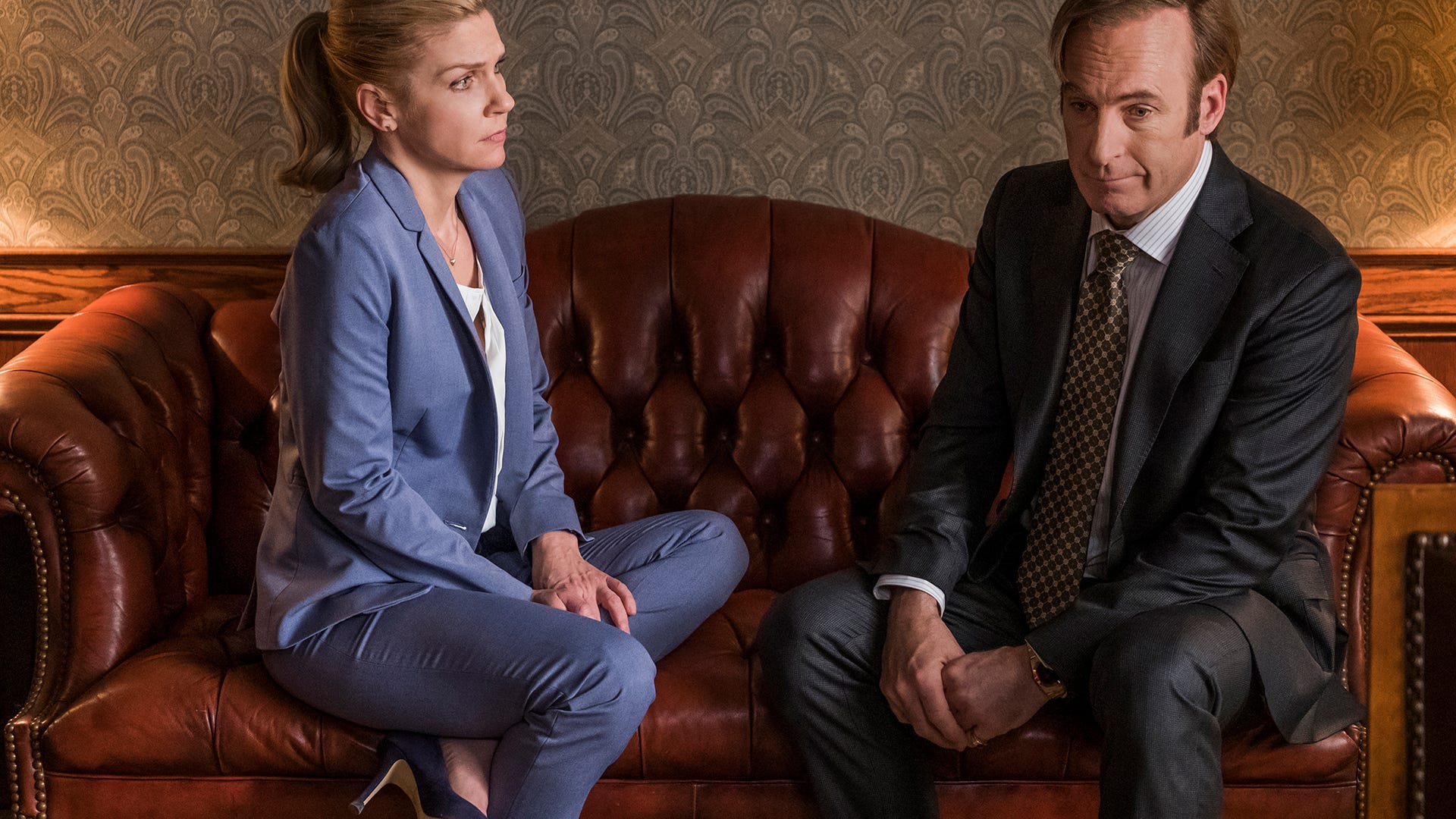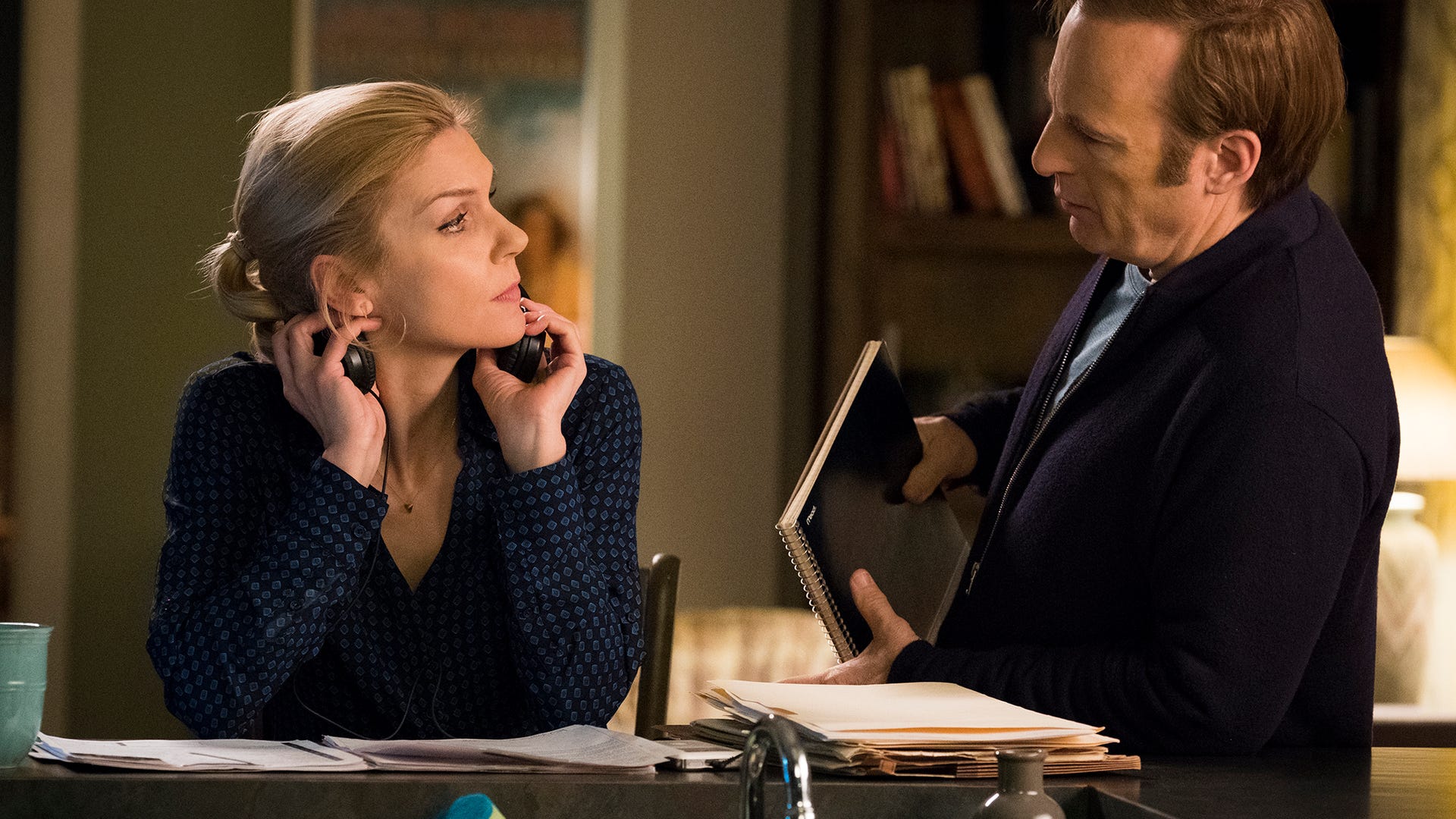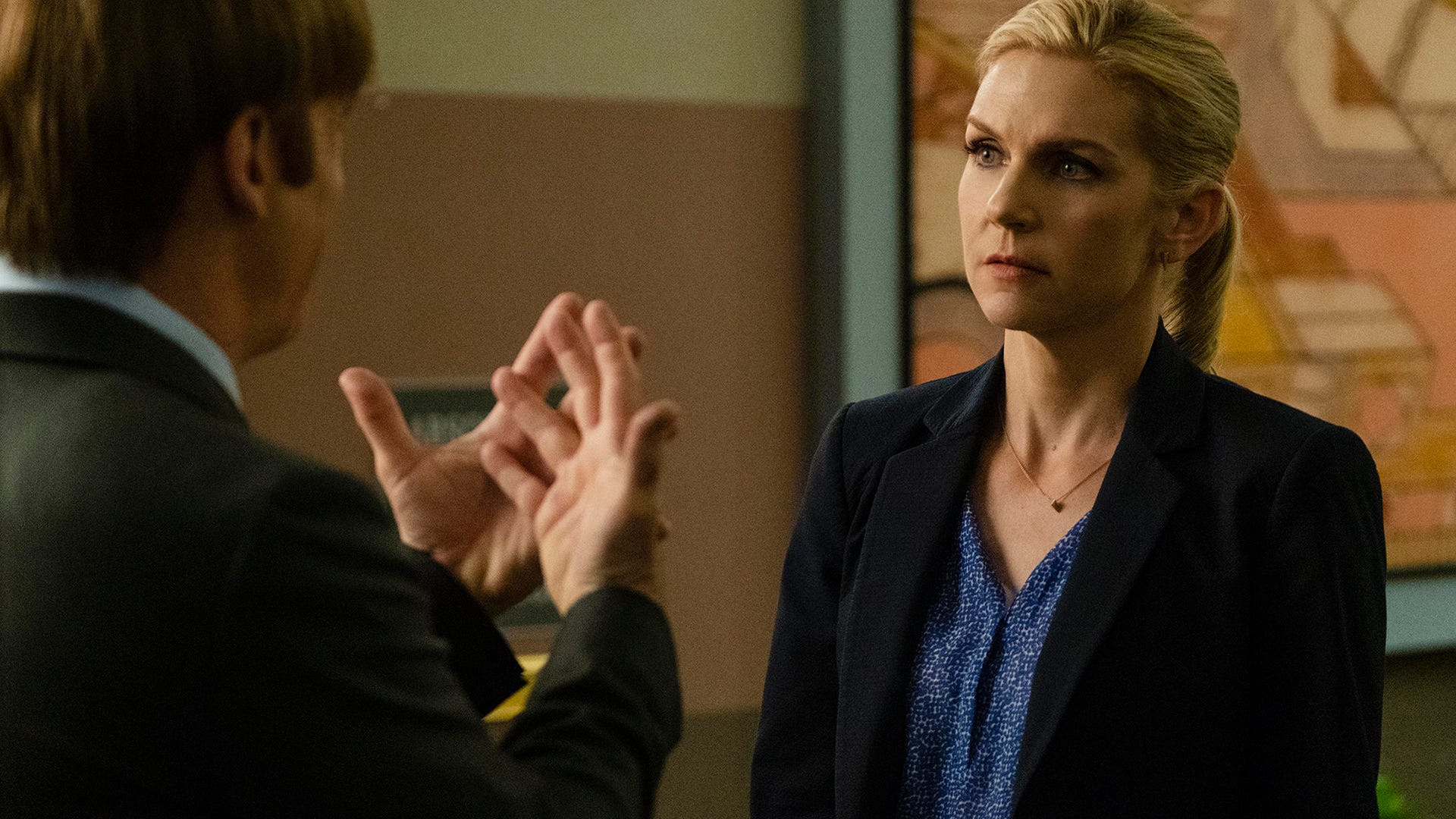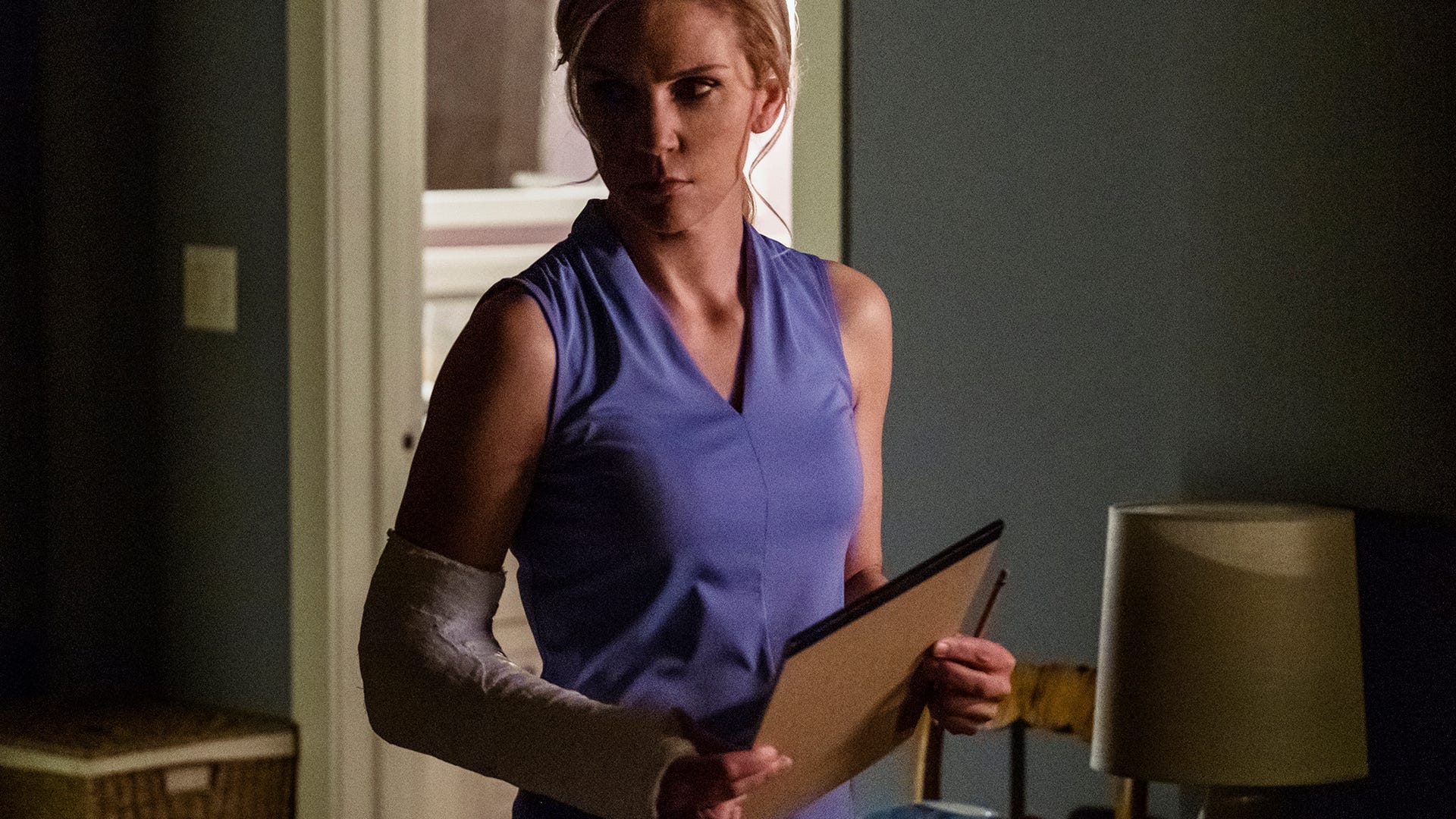Join or Sign In
Sign in to customize your TV listings
By joining TV Guide, you agree to our Terms of Use and acknowledge the data practices in our Privacy Policy.
Rhea Seehorn on Kim's Season 4 Struggle and the Better Call Saul Scene That Surprised Her
The actress reveals why she loved seeing Kim on 'shaky ground'
For Rhea Seehorn, Better Call Saullives in the unexpected. Saul may be working backwards from an ending Breaking Bad fans already know, tracing Jimmy McGill's (Bob Odenkirk) moral descent into scheming lawyer Saul Goodman, but the AMC drama isn't exactly chafing at the constraints of a prequel. At every turn -- sometimes multiple times within a scene -- Better Call Saul finds room to breathe, allowing the characters to pull the story in new directions.
"I think if it had just been some plot points, some mileposts that we have to hit to get to Breaking Bad, everyone would just be waiting for the ride to be over," Seehorn, who plays dogged lawyer Kim Wexler, told TV Guide. The actress said co-creators Peter Gould and Vince Gilligan are still "letting character dictate plot just as much as the other way around."
That's especially true for Kim, one of the few characters whose fate in the Breaking Bad era is still a question mark. Better Call Saul's fourth season pushed Kim to new limits, revealing how many lines she was willing to cross out of loyalty to Jimmy even as she grew more isolated from her grieving partner. "Season 4 more than ever, Kim, who often chooses not to speak over speaking, has a relationship with the audience," Seehorn said. "They are my closest confidante because Jimmy is not anymore. The audience became like my co-conspirator or my secret keeper. They're the only ones that knew what I was thinking in certain rooms."
Better Call Saul May Not End With Season 6 After All, Rhea Seehorn Says
TV Guide caught up with Seehorn, now filming Season 5, to take that co-conspiracy to the next level. In a thoughtful discussion, Seehorn weighed in on how Kim's ambition bonds her to Jimmy, what surprised her about Kim's outburst with former boss Howard Hamlin (Patrick Fabian), and how she landed Season 4's gut-punching final shot.
You're in a unique position because we don't know how Kim's story ends. How does that change things for you?
Rhea Seehorn: Obviously it can be daunting, because you're thinking, "Well, something happened to her then." And it used to be that the greatest tragedy would be that she's dead, but these days I'm like, wow, there are some other things that are as tragic, if not more so [laughs]. ... They have an infinite number of tragic possibilities at their hands at this point. I'm sure there could be a happy ending, but that doesn't seem to be historically the way they go. As an actor, though, for me what's fun is to also keep reminding myself that Kim hasn't seen Breaking Bad. People will say, like, "I can't believe she would deal with him doing X, Y, Z, or selling phones in the parking lot. Oh my god, doesn't she see what a monster he's gonna become?" I'm like, "No!" She hasn't seen Breaking Bad. She's not aware; she's taking these things one step at a time, and part of the fun of the show and me not knowing where I end up or what Kim's fate is is that I have to stay so present and be a part of my journey. I was a huge fan of Breaking Bad, and so this journey is all new to me as well. And Kim is not a fixed point in space any more than Jimmy becoming Saul is. It's obviously not as dramatic of a titular transformation for her, but she's not the same person we met in the pilot.
I was really struck last season by the way we saw Kim deal with feeling exhausted by her career. I don't think that's a story we see often enough from a character like her.
Seehorn: Right. What seemed new to you?
You see her questioning what she wants out of her career but not rushing to make changes. I think most people can question their lives and just sit with it, which is what we saw Kim do, but women on TV who are as driven as she is aren't usually so patient about it. And when she did make a move, it didn't involve completely blowing up her life.
Seehorn: Yeah, personally I found that very accessible as far as, this is still somebody who is trying to get a foothold in the middle class. And I love that part of the character, I'm very protective of that part of the character. It goes into costuming with the brilliant Jennifer Bryan, it has to do with how seldom she changes her jewelry and hair and clothing and everything. I grew up with these people, and you have better things to do than change purses. And I did like the idea that she feels this nagging sense of, I don't think this is what I was meant to do. I wanted to feel like I was actually doing something when I worked so hard to get a law degree, and now I'm just basically paying the bills and helping banks take over America. It doesn't feel great. But like most of us, she can't just go, "You know what, I'm just gonna be an artist and live in a ditch." She's not that person, and I don't think most of us are. She has a very pragmatic side of her. ... I think she has a crazy ambition about her that makes her not let go of Schweikart and Cokely, too. Like Jimmy. They do have these core similarities -- as different as they can be in many areas, they both have this thing where they were outsiders who are always trying to somehow get a seat at the big kids' table, and feeling a little bit like you're putting on a mask and a costume all the time. And so I love that she's trying to play both sides of that, but it's still a big struggle.
I think Season 4 saw my character struggle mightily with seeds that were planted before, which is the idea of, moral and immoral is not the same as legal and illegal. When you go about studying and practicing law, as far as I've heard and read about it, that is a very real, disruptive force for many people, having to get your head around [that] sometimes you're helping someone that you don't think morally deserves it. They do such a good job -- the whole question of deserving and undeserving is really, really difficult and something that I felt was present in the whole season.

Rhea Seehorn and Bob Odenkirk,Better Call Saul
Nicole Wilder/AMC/Sony Pictures TelevisionDoes Kim still surprise you in terms of where she draws the line with Jimmy's cons -- or doesn't draw the line? Or have you found an internal logic for her choices?
Seehorn: I think that I do, and then they surprise me. And when the writers surprise me, it never is like a stunt. It never feels like, oh, it must be sweeps week! It feels like a part of her that was always there and informing some things, and I hadn't put my finger on it yet. ... When she decides to scam to help Kevin at Mesa Verde get a bigger branch with a bigger dumb statue that she was so infuriated by in a previous episode, I was surprised, and then I thought, no, no, no, it's perfect, because it's that part of her that likes to win, and likes to be a savior and be the hero of the day. And it's not really helping anyone, and it's a pretty superficial thing to be doing. But I loved that undercutting of: She's not on sure footing. This is not a Robin Hood thing where she's very clearly making columns of deserving and not deserving. It's shaky ground for her, and I find her more accessible because of that. And I find her relationship with Jimmy more realistic. I love that it gave him a moment to be able to call her out and say, "What are you talking about, like, we're only going to do this for good? What was that? We just helped somebody build a bigger bank." And she doesn't even want to talk about it, because I think she's struggling with it. ... It's like the answer to the equation surprises me, and then I do the backwards math and realize it's not surprising at all. The other factors for the equation were always there.
Kim and Jimmy have a lot of long conversations that start one place and go somewhere completely unexpected. How do you and Bob Odenkirk find that rhythm?
Seehorn: We love those scenes. Bob and I talk about those scenes. The big blowup argument on the rooftop that [Gennifer] Hutchison wrote and Vince Gilligan directed also had some elements of, you can't figure out where this is going and then it's out of your control, and then it's about reining it in. But certainly these quieter moments -- Bob and I have had talks about the scenes they have in the bathroom, the scenes they have smoking a cigarette, even brushing their teeth sometimes. They're small and they're delicate and they're a little bit like sand that you can't hold too tight. You've got to let it keep running through your fingers and let it have its own flow. But technically what we do is we run the lines ad nauseum, because these scripts are not ad libbed, and all the beautiful nuances of language are actually written. So we rehearse them over and over until we get to a place where you show a couple that knows each other that well. And once we have those lines, now we can start playing with subtext. ... It becomes about tone so much more than the words sometimes. How did somebody say something to you, and why did you look away when you said that to me? Dancing around topics they have trouble talking about.
And then I have this ultimate gift that I have Bob Odenkirk, who's absolutely brilliant and I love him to death. We have the same dedication to our characters that we take on the set, and then we have these directors and writers that let us play. When you get an eight-page scene, or even a four- or five-page scene that has multiple interpretations, we get encouraged to show all those interpretations. What if it started as an argument that becomes flirting versus flirting becoming an argument? Or what happens if you walk out of the room for a second while I'm still talking to you -- what does that change?

Rhea Seehorn and Bob Odenkirk, Better Call Saul
Nicole Wilder/AMC/Sony Pictures TelevisionWere there any scenes in Season 4 that went in a direction you didn't expect once you started filming?
Seehorn: The scene with Patrick Fabian, the scene where I go in to talk to Hamlin, on the page it said, "Kim loses it." And there was some different phraseology that all centered around that kind of thing. I talked to [writer] Tom Schnauz about it and I talked to Michelle MacLaren, the director, about it, and Peter Gould as well, the showrunner, trying to figure out -- that's very specific to an individual human, so for Kim to lose it, someone who's that in control all the time, what does that look like? Is it the tiniest crack? Is it the tiniest fissure? For my prep before I got there, I started thinking about, well, what did she plan to go there to say, and what took over the conversation in that moment? ... The struggle to not fall apart, any actor will tell you, is inherently going to be more interesting than somebody who's falling apart. And so I thought Kim would struggle mightily against herself for losing it, especially in public, in a professional space, and to feel like she would ever give somebody the upper hand by becoming -- I think a lot of women would identify with this, that feeling of, if I start getting that tremble in my voice, or looking teary while I'm trying to make a point to a superior, I gave my cards up. I think as women, we worry that we're going to be seen as emotional instead of having a point. And you have a point, and you have every right to say what you're going to say, and then all of a sudden you feel that tremor in your vocal cords, and you're like, god damn it! [Laughs]
Right. Not now!
Seehorn: Yes! Not now, please don't, not here. And Michelle kept pushing me, with love and grace and intelligence, saying, "You know this point right here where you've decided that you can collect yourself for a second? Don't inhale all the way. Only let yourself have half an inhale because it's an unsuccessful attempt to collect yourself." ... That was a big surprise to me from page to there. I thought it would be much smaller, and what it ended up being was actually, I think you physically see someone being surprised by their emotions and trying to stop a speeding train. And that's inherently more interesting to me, and more Kim, than if she had just teared up and said, "You're awful to Jimmy," and stomped her foot.

Bob Odenkirk and Rhea Seehorn, Better Call Saul
Nicole Wilder/AMC/Sony Pictures TelevisionAt the end of the season, we left Kim realizing she'd been taken in by Jimmy during his hearing as much as everyone else had. What did that moment mean for her?
Seehorn: It's a lot. I mean, what a painful thing. ... She's part of a con. It is a scam. There's no way around it. They falsely set up funeral memorials, and he really did buy the library branch in Chuck's name and all of that, but still, it's an attempt to create a character portrait that is false. At least it's falsely created. But Kim, I think, believes that [Jimmy] is just not able to access these emotions yet, so all we're doing is faking the presentation, we're not faking the person. And then when he's in there, he changes what their plan was, and I think part of what she's so upset about is she wasn't even aware of what a relief it would be to see that part of him -- to see the sincere, emotional part of him.
And then to come outside and realize that it was a scam -- luckily, [director] Adam Bernstein staged it so that Jimmy never actually sees Kim tear up. He does not see her shift in her face when he says, "Did you see that idiot in there who teared up on the panel?" Because that's just malicious, and we're not there. We're not at a place yet where Jimmy is completely obtuse or, worse, doesn't care if he hurts Kim. He does. I guess he is obtuse in a way, but it's more that he's just always in his own head. It is never meant to be awful to her. So they did a great job with staging it so that it's private for Kim. And she can't even process that before he turns around and says, "I'm gonna change my name to Saul Goodman," and it's like, "What?" I didn't realize -- I know it was in the script, but I don't think I really realized they were going to end the whole season on just my face looking at him, which is probably good that I didn't really underline that part of my script, because I think I would have worried about: What's the monumental, impactful face we should leave it on? And instead I stayed in Kim's skin and tried to take what was getting thrown at me as fast as I could. And you're just left stunned. ... I love that last shot as they pull away because there were so many questions she's trying to process at the same time, but for the most part you just feel like you got left on an island. She does not understand where she's at. Who is this person she's talking to, and did he betray me? What happened in that moment? And for her probably the hardest question, I would think, would be: And why was I so taken by that? What does that mean if that's the person I'm in love with?
I was surprised by how much that ending hit me even though we know what's coming for Jimmy.
Seehorn: I honestly can't believe how genius it is what they've done. It's hard enough to do a prequel that's just one episode or one movie because you now have people that already know the ending. To end up creating as complex of a world and characters that are the pre- in this monumental mothership called Breaking Bad is astounding to me. It's definitely a testament to the writing. ... Kim has been probably my all-time favorite character and one of the most challenging characters I've had in doing this 20 years, but it is also the result of a village of people that do nothing but support me and encourage me: Go ahead, take a four-minute silence! No, you don't have to smile at Jimmy when you're in an argument just to let him know it's OK. And that might sound weird to you, but that's a note that I've been given in my career before. They let her be real, and they're letting all the people in this prequel be real.
Better Call Saul is available to stream on Netflix.

Rhea Seehorn, Better Call Saul
Nicole Wilder/AMC/Sony Pictures Television